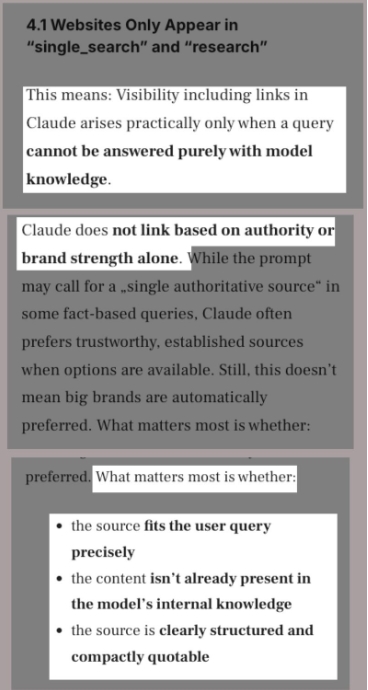Answer
Jun 02, 2025 - 07:25 AM
Chris Long reported on communication from Claude on if/when/where sites will be referenced and quoted, and there would be links back to the sources of the content as SEOs are used to with traditional SEO practices. They said this and Chris Long highlighted it in his post (we recommend you follow Chris Long, he stays up to date with the latest/greats on SEO and where it's going).

Basically....if a topic is well known and the AI is comfortable that the information is very clear and valuable, and that it's able to just communicate back confidently about the topic.....then it kind of throws it into a bucket of "general knowledge" and they don't really look at your site as special to be pointed out or reference. Imagine asking the question "What color is the sky?" and it gives you back "the sky is blue"......it's not going to say "the sky is blue because John reported back on that and you can trust him on it, go to his website because he's a reliable source". The thing is, since AI can read literally through every piece of public knowledge that has been made accessible....it has A LOT more topics that it considers general knowledge and consensus. So no, you're not going to get credit for that.
We would assume the "no present knowledge" will include knowledge that is not well known or there is not known consensus on a topic. With the new products/experiences, etc......it will rely on people's new experiences with the new products/environments, and have to lean on and reference that. We suspect there will be some kind of "there doesn't seem to be consensus on this topic but xyz has said this" responses.....and it'll come back to the EEAT that Google communicates about. Even with consensus, the consensus opinion becomes unreliable over time on some topics as the world/environment changes.....so they'll need a way to account for that. The sites/companies/people that will win in this space are the ones communicating real personal experience about various topics that they know about...because AI needs it to survive/thrive...and they will need to incentivize the creation of that (similar to what Google has done with the Helpful Content Updates). The SEO ecosystem needs to focus on sourcing that original content and then applying their great writing/seo experience to that content to brush it up and optimize it......Google's incentives have shifted to that and AI will need to do something similar. Answerbase helps;)

Basically....if a topic is well known and the AI is comfortable that the information is very clear and valuable, and that it's able to just communicate back confidently about the topic.....then it kind of throws it into a bucket of "general knowledge" and they don't really look at your site as special to be pointed out or reference. Imagine asking the question "What color is the sky?" and it gives you back "the sky is blue"......it's not going to say "the sky is blue because John reported back on that and you can trust him on it, go to his website because he's a reliable source". The thing is, since AI can read literally through every piece of public knowledge that has been made accessible....it has A LOT more topics that it considers general knowledge and consensus. So no, you're not going to get credit for that.
We would assume the "no present knowledge" will include knowledge that is not well known or there is not known consensus on a topic. With the new products/experiences, etc......it will rely on people's new experiences with the new products/environments, and have to lean on and reference that. We suspect there will be some kind of "there doesn't seem to be consensus on this topic but xyz has said this" responses.....and it'll come back to the EEAT that Google communicates about. Even with consensus, the consensus opinion becomes unreliable over time on some topics as the world/environment changes.....so they'll need a way to account for that. The sites/companies/people that will win in this space are the ones communicating real personal experience about various topics that they know about...because AI needs it to survive/thrive...and they will need to incentivize the creation of that (similar to what Google has done with the Helpful Content Updates). The SEO ecosystem needs to focus on sourcing that original content and then applying their great writing/seo experience to that content to brush it up and optimize it......Google's incentives have shifted to that and AI will need to do something similar. Answerbase helps;)

